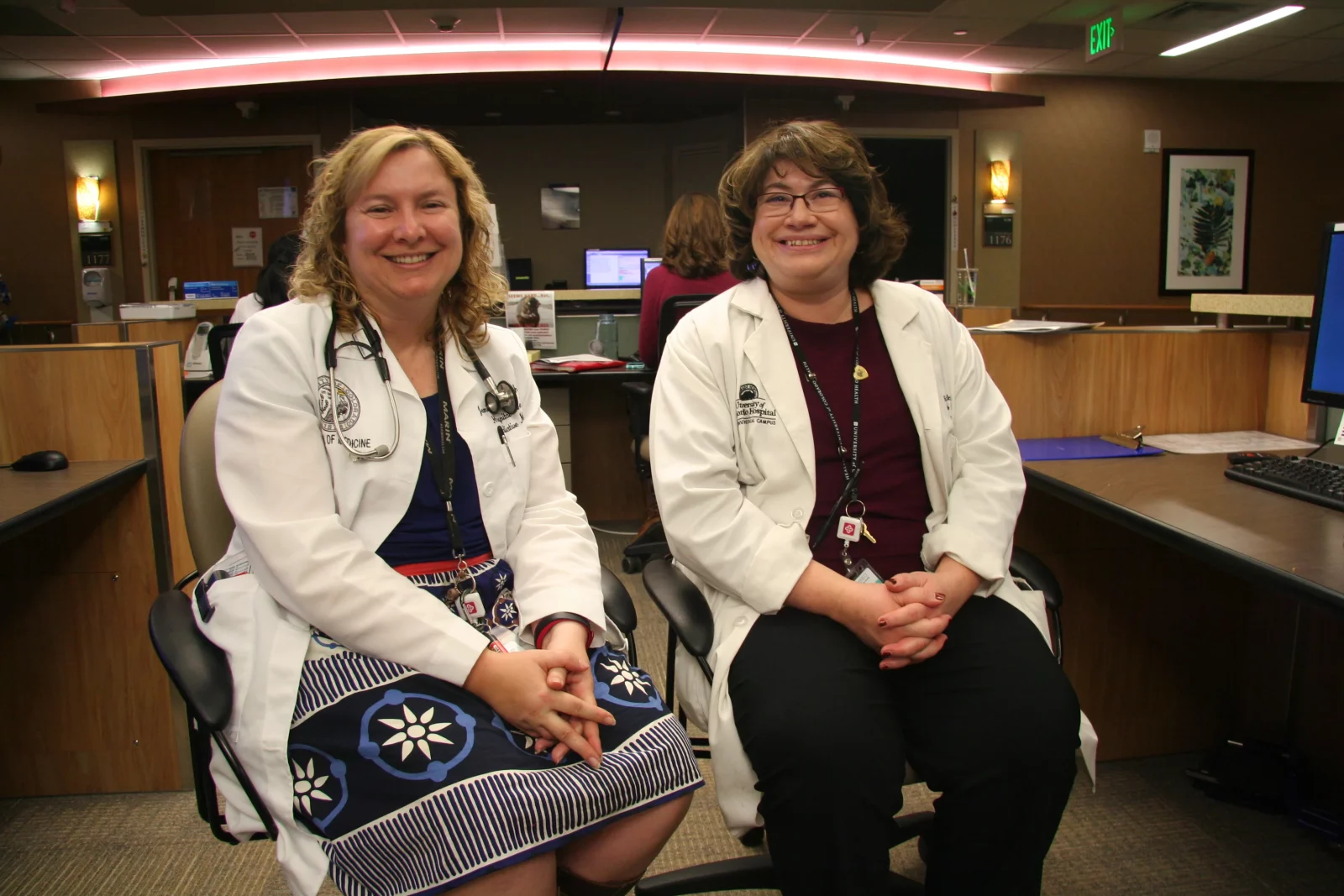University of Colorado Hospital’s inpatient palliative care program wrapped up a one-day Joint Commission site visit with a double distinction on Dec. 18. The program earned its second consecutive two-year advanced recertification without a single recommendation for improvement.
Joint Commission surveyor Charles Kellerman, MD, a California geriatrician and palliative care specialist with some 35 years of experience, expressed admiration for the program’s development, said Hareklia Brackett, ANP, lead advanced practice nurse for the inpatient Palliative Care Consult Service (PCCS).
“He said ours was better than his program,” Brackett said.
Hard work rewarded

Those were especially satisfying words for Brackett, who helped to launch the program in 2005 with Jeanie Youngwerth, MD, medical director for the PCCS, and Jean Kutner, MD, an internist and palliative care specialist who is now chief medical officer for UCH. A decade ago, the three developed the program, Brackett said, and a small team averaged 11 palliative care consults a month. Today, many more physicians and advanced care practitioners have joined the team, along with a dedicated social worker, a chaplain, and three specially trained volunteers. They now handle up to 90 consults a month.
“We’ve made more of an impact than I ever thought we would make,” Brackett said. “I didn’t think we would be as robust as we are now.”
“The service has grown quickly, to a high number of patients, without sacrificing the quality of care,” added Jamie Nordhagen, RN, nurse manager of the Oncology/Gynecologic Oncology/Medicine Unit at UCH. “They are a tremendous asset to our unit in the support they give to nurses and providers.”
In Brackett’s view, the service’s growth is attributable to strong support by hospital administration, which has helped to drive important improvements, such as four floating palliative care beds on the Oncology Unit in AIP 2 and an outpatient clinic that launched last summer. Also important, she said, is greater understanding among patients and families of the true role of palliative care, which focuses on managing pain and symptoms, providing emotional support, and maintaining quality of life for those with serious illnesses.
“Patients have become more engaged in advocating for themselves,” Brackett said. “More of them have been reading about palliative care and understanding it doesn’t have to mean going into hospice.”
A new generation of medical providers is also learning about palliative care and gaining a better understanding of the value it can bring to their care, she added.
“More providers are recognizing it as the only service that provides emotional, social, spiritual, and physical support,” Brackett said. Oncology still accounts for the majority of palliative care consults, she added, but palliative care continues to integrate with services that include Heart Failure, Acute Care for the Elderly, and Hepatology, she added.
Words and deeds
Kellerman’s visit began with a lengthy presentation by the palliative care team that reviewed the history of the program and important successes the past two years, including process-improvement projects that streamlined getting care to patients who need it and decreased hospital length of stay and the cost of care. But Youngwerth said the surveyor was most interested in seeing the care actually provided on the units and confirming that providers take the time to listen to patients and help them to identify and meet their goals of care. He talked with providers and staff, looked at advance-care planning and advance-directive records in the medical charts, and attended a meeting with the family of a patient and providers.
“He saw that we practice what we preach,” Youngwerth said.
Kellerman was impressed with the communication skills of the hospital’s palliative care physicians, Youngwerth said, but he also noted the effort to lend emotional support to those caring for patients and families in distress. A pillar of that effort is the “Good Grief Rounds,” led by Katie Morrison, MD, a palliative care physician at UCH. The rounds, held every other month, give resident and attending physicians an opportunity “to openly talk about cases that stuck with them,” said Erin Rosenberg, LCSW, a social worker with the palliative care team.
The time to talk isn’t necessarily about finding solutions to difficult situations, such as working with a patient who disagrees with a prescribed plan of care, Rosenberg said. Rather, talking is a form of self-care and a way to lessen the chance of emotional burnout through storytelling, she said.
The concept could spread to other providers, such as physical therapists and nurses, Rosenberg added. “There is a need for it across the hospital,” she said.
While the Joint Commission certification is for the inpatient program, Youngwerth said it’s important to continue expanding outpatient services and programs for patients in the clinic and the community. The team also aims to spread awareness of palliative care to primary care providers and help them gain the skills and resources to assist patients when they are not in the hospital.
“We want to reach more people sooner in their care,” Youngwerth said. The successful site visit is only the latest leg in a long run of progress for the palliative care program, she added. “We’re going to continue to improve and evolve.”
